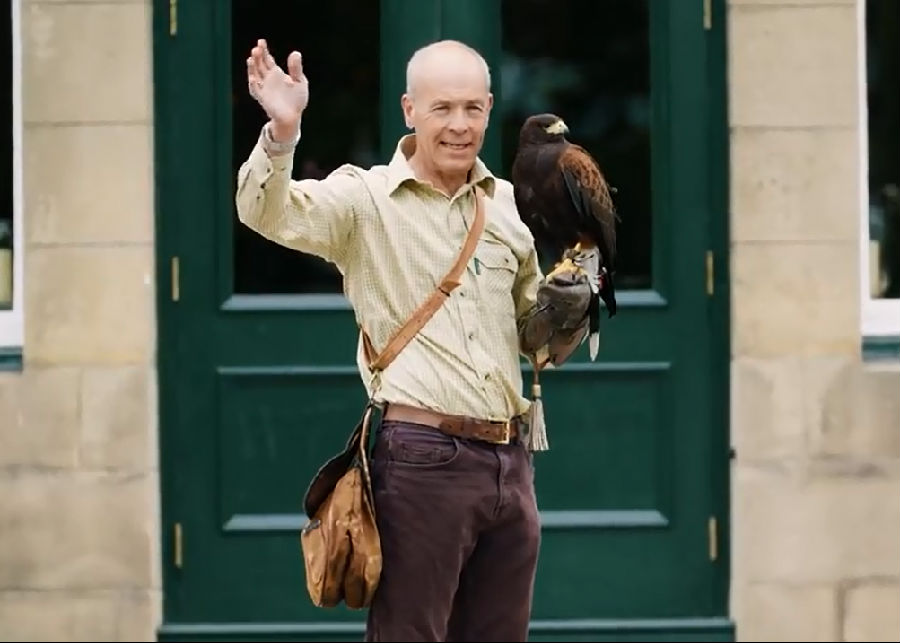(单词翻译:单击)
You know this guy, William Shakespeare.
这哥们儿认识吧?莎士比亚。
He's widely regarded as the greatest writer in the English language.
他被公认为英语世界最伟大的作家。
And here's Steve with his Harris' hawk Margo. Hi Steve.
这是史蒂夫和他的栗翅鹰“玛戈”。史蒂夫你好。
What do they both have in common? Let me explain.
他们两人有什么共同之处呢?不妨让我来解释一下
So, what is falconry?
嗯,何谓训鹰术呢?
Falconry is defined as the art of using a trained bird of prey flying at quarry.
训鹰术的定义是用一只受过训练的猎鸟来获取猎物的一种技术
Essentially it's catching your dinner using a bird of prey.
从本质上将,就是用猎鸟获取晚餐食材的技术
It's been around for thousands of years
训鹰术已经有几千年的历史了
and it was so popular back in the 16th century
而且,它在16世纪达到了如此受欢迎的程度
that Shakespeare starting using it in his literature.
以致于莎士比亚都开始在他的作品里提到这一技术
He was such a prolific falconer that everyone started using his phrases.
他用了相当多的训鹰术术语以致于大家都开始用他的词。
So much so, these expressions are ingrained in the English language today, like "fed up".
最终,这些表达就进入了我们今天的英语,比如“厌倦”一词。
When Margo has been out hunting,
玛戈出去捕捉猎物的时候
what happens is she will eat until she gets to a point where literally she is fed up to here, she is full.
她会一直吃,直到吃到这么多为止,那时她就饱了。
She doesn't want to do anything, so she sits still, looks miserable,
饱了之后它就什么都不想做,它就站着不动,一副很难受的样子。
and therefore we say to people, like the kids:
所以我们会对别人,比如小孩子说:
"Look at you, sitting there, looking fed up"
“看看你,坐在那儿跟“厌倦了”似的
All birds, for thousands of years, have always worn these two little jesses,
几千年来,无论什么鸟,都会戴这两个脚带
these leather straps, attached to each leg,
这些皮质条子被拴在它们的两只脚上,
and when we hold onto her,
我们抓住它的时候
we put them "under the thumb" and through the fingers.
我们把它玩弄于股掌之间
Therefore we have restraint,
这样我们就可以控制住它们
therefore we can hold him back just like an errant husband.
就可以像拉不忠的丈夫一样把它们拉回来
All you've got to bear in mind is that if something's been around for so long,
你要记住的是如果有个东西在我们生活中存在了很长时间
then it's bound to have an impact on the vernacular.
它一定会影响我们的口语。
The falcon generally wears a hood
我们通常都要给鹰戴上头套
because they're very highly strung, very nervous,
因为它们神经高度敏感、高度紧张,
and the hood is a calming down device.
头套这种工具可以让它们平静下来
What we do is when we put the hood on him,
我们给它戴上头套的时候
we're actually fooling him into thinking it's gone dark.
我们其实是在骗它们,让它们误以为天已经黑了
So you've tricked him and you "hoodwinked" him, using a hood, to think it's nighttime so he relaxes.
所以,你跟它耍个把戏,用头罩“欺瞒”它,让它误以为是晚上了,它的神经就会放松点儿。
As well as holding these leather straps or jesses,
握着这些皮条子或者说是脚带,
the leash fastens onto the glove
我们的皮带呢要拴在手套上
and then we wrap it around a finger,
然后把它夹在手指之间,
it's like a belt and braces,
这样就万无一失了
it's an extra precaution in case we lose the bird.
这是一种额外的防护措施,以防它们飞走。
Haggard comes from an old bird that has learned to hunt.
野鹰是由鹰科里一个很早就开始自学捕猎的种类
You trap her once she's learned to hunt,
当它学会捕猎后你把它抓住
therefore she's a better hunter because she's learned on her own,
这样一来,它就成了一个更好的猎手,因为它是自己学会捕猎的
which is where we get the word "an old hag from now".
这也是“老司机”一词的来源。
And how many people have used that every day
有多人少人是经常用这个词
and don't realize it's actually a falconry expression?
但不知道它原来是一个训鹰术的术语的呢?
So there we have it. Thank Shakespeare.
原来这个词是这么来的,多亏了莎士比亚啊。


